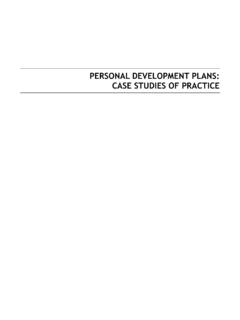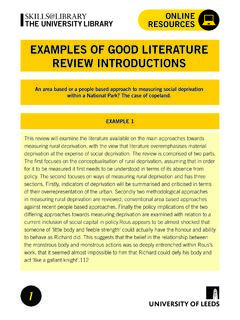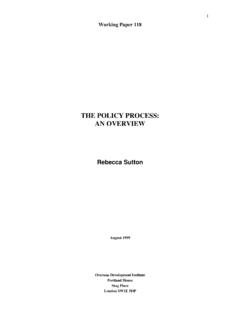Transcription of Performance management literature review
1 Performance management literature review Catherine Chubb Peter Reilly Duncan Brown Institute for Employment Studies IES is an independent, apolitical, international centre of research and consultancy in HR issues. It works closely with employers in all sectors, government departments, agencies, professional bodies and associations. IES is a focus of knowledge and practical experience in employment and training policy, the operation of labour markets, and HR planning and development. IES is a not-for- profit organisation . The IES HR Network This report is the product of a study supported by the IES HR Network, through which members finance, and often participate in, applied research on employment issues. Full information on Network membership is available from IES on request, or at Institute for Employment Studies Sovereign House Church Street Brighton BN1 1UJ. UK. Telephone: +44 (0)1273 763400. Email: Website: Copyright 2011 Institute for Employment Studies IES project code: 99993-2281.
2 Contents 1 Introduction 1. 2 The Purpose of Performance management 2. 3 A Shift in Emphasis in Performance Appraisals 4. 4 Critiques of Performance Appraisal 7. Process design 7. Process execution 8. Manager's role 8. 5 Improving the Effectiveness of Performance Appraisals 9. Simplification 9. Regular and quality discussions 13. Committed and capable managers 16. Strong leadership 18. Align with organisational goals 18. Integration with the culture 19. Tailored to employees 20. Use of technology 22. Monitored systems 22. 6 Performance management and Reward 24. Competency-related pay 24. Results driven Performance related pay 25. Contribution based pay 27. 7 Personal Development Planning 28. 8 Career and Talent management 31. 9 Managing Poor Performance 33. 10 Conclusion 35. iii References 37. iv Institute for Employment Studies 1. 1 Introduction This paper reviews the literature on Performance management and appraisals to see where there may be useful learning for organisations.
3 It also provides important criteria on which to judge the effectiveness of the implementation of a Performance management system. Firstly, we examine the purpose of Performance management systems, then the changes organisations are making to their systems to support a shift from appraisal towards a more rounded Performance management approach. We then highlight the common critiques of Performance management systems. The focus of the paper then turns to the key themes which determine the effectiveness of a Performance management process. This is followed by a review of the link between Performance management and reward; personal development planning and career and talent discussions and the management of poor Performance through appraisal. 2 Performance management : literature review 2 The Purpose of Performance management There are many tensions within the multiple agendas and purposes of appraisals. Boswell and Boudreau (2000) make a most useful and clear distinction between two types of functions for appraisal systems: Evaluative functions include use of Performance appraisal for salary administration, promotion decisions, retention/termination decisions, recognition of individual Performance and identification of poor Performance .
4 To conduct this evaluative function the appraiser takes the role of the judge'. Evaluative functions focus primarily on differentiating between people. Developmental functions include the identification of individual training needs, providing Performance feedback, determining transfers and attachments, identification of individual strengths and weaknesses. For this developmental function the appraiser takes the role of a coach or mentor. Developmental functions focus primarily on within person analysis. A CIPD Performance management survey showed that in the UK, while there has been a broadening in purpose and the linking of some of these different processes designed to impact on Performance , the main purpose of the Performance management process largely still revolves around personal objective setting and appraisal against objectives. This is included in the process in 90 per cent of cases (CIPD, 2005). Trends that have continued since the CIPD's previous survey (in 1997) showed that there is an increasing focus on the development aspects of appraisal, and also devolvement of control and operation of the process from HR.
5 To line managers (CIPD, 2005). Baron (2004) claims that the focus of Performance management is on elements such as recognition, constructive feedback, personal development and career opportunities. However, there will always be an inevitable tension within career management which has to satisfy both the interests of the organisation and those Institute for Employment Studies 3. of the employee. Individuals may demand a career where there is scope for development and progression, whilst organisations will need to ensure they have the right people in the right jobs and are building a talent pool for the future'. (CIPD, 2003). 4 Performance management : literature review 3 A Shift in Emphasis in Performance Appraisals Much literature has pointed to the problems with Performance appraisals, which has led some commentators to call for abolition of the process or a renewed focus on the core elements of Performance appraisal. For example, Coens and Jenkins based on their experience in North America recommended abolishing Performance appraisals' (2000), citing regular failings in development planning, objective setting and 360 degree feedback.
6 They advocate instead broader Performance management approaches focused on customer outcomes and decoupling the complex mix of processes often tied up inside Performance appraisal. They cite a Police Department in Madison, Wisconsin which replaced traditional appraisals with a system of individual goal setting, leadership training and employee involvement that let officers choose who they wanted to work with and who supervised them. A US Department of Justice comparative study found that Madison had the highest levels of citizen satisfaction following the changes. Gratton and Ghoshal (2002) argue that at all levels, the emphasis should be on the core of the appraisal and development process, that is improving the quality of conversations', rather than going through dehydrated rituals', with open and honest leaders setting the example for a culture of curious, creative learning organisations. Cunneen (2006) also highlights the issue of managers and employees simply going through the motions of the process when he stated: Not only do managers dislike carrying out Performance appraisals but many admit that it is the most dreaded task in their calendar.
7 Too often it leads to a shallow discussion, with both parties colluding to meet the organisation 's prescribed administrative procedure and, in doing so, avoiding the more fundamental issue of Performance improvement.'. These failings of appraisal have led to new approaches to Performance management . Institute for Employment Studies 5. Hurst (2009) discerns two strands in the Performance management literature : a very structured and controlled backward-looking review approach which is done'. to employees (Grote, 2000), and a much more inclusive, forward-looking approach involving the individual, supporting their development and linking in to the organisation 's needs and values (Spangenburg and Theron, 2001). But as Cannell (2006) points out, there is still the need for a conversation to both reflect on past Performance and to look forward. The latter is what is largely in the mind of those that advocate a more root and branch change to Performance appraisal: a switch to a Performance management philosophy that engages employees more in the process and drives Performance towards key organisation goals.
8 The concurrent simplification of processes that is underway switches the focus on individual scheme details and towards the essence of the Performance management process. In their book on the subject, Armstrong and Baron (2005) note the shift in terminology from Performance appraisal to Performance management , which they believe indicates a wider shift in the philosophy and content of the process: Performance appraisal has a reputation as a punitive, top-down control device, an unloved system. Performance management is a holistic, total approach to engaging everyone in the organisation in a continuous process, to improve everyone and their Performance , and thereby the Performance of the whole organisation .'. Despite the move to adopt an all-encompassing approach, a recent trend towards simplification is also evident from CIPD research, with better support and training being provided as greater focus is being put on how these systems actually work in the reality of the organisation , rather than in respect of the many intended policy intention and outcomes.
9 Just under half of the respondents to the CIPD Performance management survey (48 per cent) had proposed to make changes to their Performance management arrangements over the forthcoming year, with a similar direction evident (CIPD, 2005). E-reward's survey (2005) of Performance management provides a clear picture of the changes that organisations are making to support the shift towards a Performance management approach, but also to address problems such as over- complexity and bureaucracy. More than two-thirds of organisations in the E- reward research had either changed their systems in the past three years or were planning to make changes in the future. The commonest changes are shown in Figure Colville & Millner (2011) recognise that a trap that organisations can fall into is not recognising that the implementation of Performance management is a change 6 Performance management : literature review process. Too often, organisations just look over the fence to what others are doing and do the same' (2011, ).
10 They argue that this practice is reasonable but it needs to be coupled with an understanding of how the process will deliver organisation strategy and vision'. In order to achieve this, they argue HR needs to have an awareness of the current state', the desired state' of the organisation and its processes. Figure : External trends: Changes in Performance management systems Past Changes Future Changes 1 Competencies inclusion Enhance link to pay Streamline the Performance 2 Enhancing pay link management process Provide more More regular 3 coaching/development for meetings/feedback appraisers 4 Simplification review /improve ratings process Link Performance management 5 More regular feedback to strategic business goals Source: E-Reward. Rankings are based on the percentage of organisations with Performance management systems planning changes Institute for Employment Studies 7. 4 Critiques of Performance Appraisal Criticisms of Performance appraisal type processes are not new. Writing in the Harvard Business review in 1959, Likert observed that: Performance review interviews as a rule are seriously deflating to employees' sense of importance and self worth.















